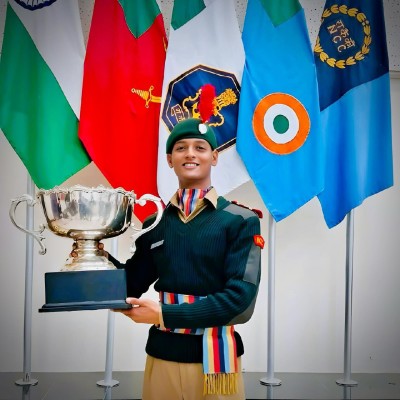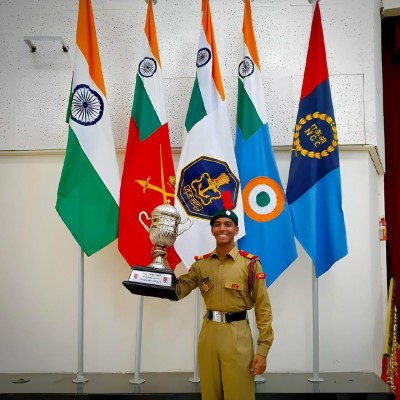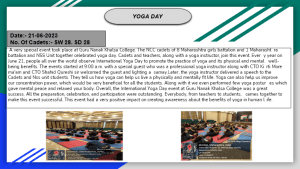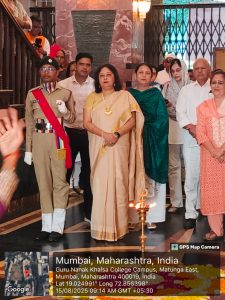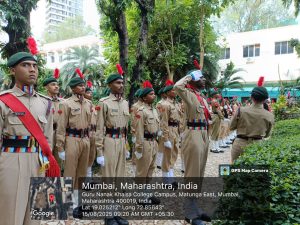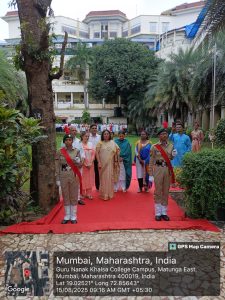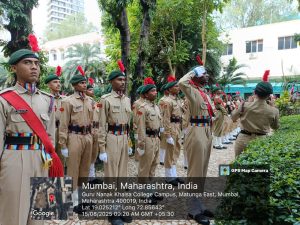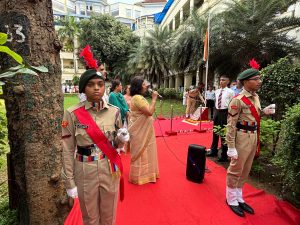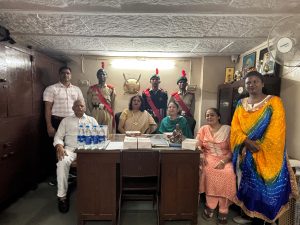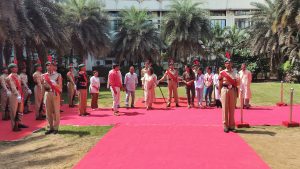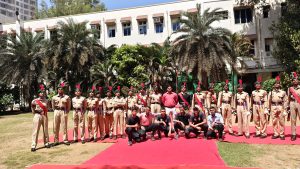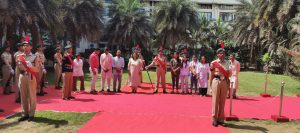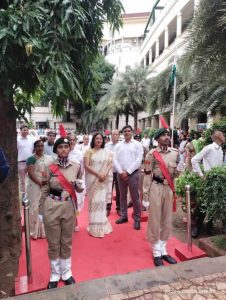NCC
- Home
- /
- NCC
The National Cadet Corps is the Indian military cadet corps with its Headquarters at New Delhi. It is open to school and college students on voluntary basis. National Cadet Corps is a Tri-Services Organization, comprising the Army, Navy and Air Force, engaged in grooming the youth of the country into disciplined and patriotic citizens. The National Cadet Corps in India is a voluntary organization which recruits cadets from high schools, colleges and Universities all over India. The Cadets are given basic military training in small arms and parades. The officers and cadets have no liability for active military service once they complete their course but are given preference over normal candidates during selections based on the achievements in the corps.

Motto of NCC: Unity and Discipline |
History of NCC
NCC was firstly started in 1666 in Germany. The NCC in India was formed with the National Cadet Corps Act of 1948. It was raised on 15 July 1948. The origin of NCC can be traced back to the ‘University Corps’, which was created under the Indian Defence Act 1917, with the objective to make up the shortage of the Army. In 1920, when the Indian Territorial Act was passed, the ‘University Corps’ was replaced by the University Training Corps (UTC). During Indo-Pakistani war of 1965 & Bangladesh-Pakistani war of 1971, NCC cadets were second line of defense. They organized camp to assist ordnance factories, supplying arms and ammunition to the front and also were used as patrol parties to capture enemy paratroopers. The NCC cadets also worked hand in hand with the Civil defence authorities and actively took part in rescue works and traffic control.
After 1965 and 1971 wars NCC syllabus was revised. Rather than just being second line of defence, NCC syllabus laid greater stress on developing quality of leadership and officer like qualities. The military training which the NCC cadets received was reduced and greater importance was given to other areas like social service and youth management.
N.C.C. at G.N.Khalsa College
Objective: The key objectives or goals of the NCC.
The National Cadet Corps (NCC) has several objectives, including:
-
Developing character
The NCC aims to develop character, discipline, comradeship, and a secular outlook among young citizens.
-
Creating a pool of motivated youth
The NCC aims to create a pool of organized, trained, and motivated youth with leadership qualities.
-
Providing leadership
The NCC aims to provide leadership in all walks of life, including the Armed Forces.
-
Serving the nation
The NCC aims to create a pool of youth who will serve the nation regardless of their career choice.
-
Motivating young Indians
The NCC aims to provide an environment that motivates young Indians to join the armed forces.
-
Exchange of cadets
The NCC's Youth Exchange Programme (YEP) allows cadets to exchange with other countries and participate in activities.
Activities
- Annual Training Camp (ATC) – Basic training camp organized locally.
- Combined Annual Training Camp (CATC) – Covers advanced skills, including weapon training and cultural competitions.
- National Integration Camp (NIC) – Promotes unity in diversity among cadets from various regions.
- Republic Day Camp (RDC) – Held in Delhi; top cadets participate in the Republic Day Parade.
- Thal Sainik Camp (TSC) – Focuses on Army Wing cadets, with events like firing, map reading, and OT.
- Vayu Sainik Camp (VSC) – For Air Wing cadets with gliding, aircraft recognition, and flying skills.
- Nau Sainik Camp (NSC) – For Naval Wing cadets, with boat pulling, sailing, and signaling events.
- Adventure Camps – Activities like trekking, paragliding, and mountaineering.
- All India Trekking Expedition – Organized in mountainous regions to promote fitness and endurance.
- Youth Exchange Programme (YEP) – International exchange camp to build cross-cultural ties.
- Ek Bharat Shreshtha Bharat Camp (EBSB) – Promotes cultural exchange between states.
- Leadership Development Camp – Focuses on leadership, team-building, and communication skills.
- Basic Leadership Camp (BLC) – Early leadership exposure for cadets.
- Pre-RDC and Pre-TSC Camps – Intensive practice sessions before participating in RDC or TSC.
- Para Basic Course – A special course where cadets undergo parachute jumping training.
Alumni
Opportunities and Future in NCC
In Armed Forces:
Direct Entry to Armed Forces: ‘C’ Certificate holders are exempted from written exams for SSB interviews in the Army (OTA Chennai). Special quota for NCC cadets in the Army, Navy, and Air Force recruitment.
Indian Territorial Army: NCC cadets are preferred for officer posts.
Government Jobs:
Paramilitary Forces: Cadets get preference in recruitment for CRPF, BSF, ITBP, and CISF. State and Central Government Jobs: Extra marks or quotas are available for NCC cadets in UPSC, Railways, and Police Services.
Leadership Skills: Cadets gain practical leadership experience through parades, camps, and events.
Disaster Management: Training in rescue operations, first aid, and disaster relief prepares cadets for future emergencies.
Adventure Activities: Trekking, mountaineering, parasailing, and sailing boost confidence and endurance.
Youth Exchange Programs (YEP): Cadets are selected to represent India abroad, building cross-cultural exposure.
Officer Training Academies (OTA): ‘C’ Certificate holders can join OTAs for officer-level training in the Army.
Cadet Welfare Society (CWS) Scholarships:Financial assistance for cadets based on merit and need. Amounts can range from ₹6,000 to ₹12,000 annually for deserving cadets.
Sahara Scholarships: For cadets who excel in academics and NCC. Up to ₹30,000 for college students.
PM Scholarship Scheme: For wards of ex-servicemen and cadets with ‘B’ and ‘C’ certificates. ₹2,500 per month for boys and ₹3,000 per month for girls.
Reservation in Colleges and Universities: Some institutions offer reserved seats for NCC cadets.
Certificate Holders Benefits:
‘B’ Certificate: Gives preference in college admissions and eligibility for ‘C’ Certificate exams.
‘C’ Certificate: Provides direct entry to SSB interviews for armed forces recruitment. Offers additional marks or reservations in several government jobs and higher education programs.
Soft Skills Development: NCC focuses on teamwork, public speaking, discipline, and time management.
Social Recognition: Active participation in NCC enhances a cadet’s resume and gives them an edge in interviews and competitive exams.
Committee
-
Ms Kirti More
In charge Girls' Wing
-
Dr Arvind Singh
In Charge Boys' Wing
-
Mr. Abhilash Tiwari
Member
-
Mrs. Meenakshi Vaylure
Member
- PM JAN DHAN YOUJNA
- Kargin Vijay Diwas
- Independence Day
- Achievement
- Ncc Day Event
- Yoga Day
- Kargin Vijay Diwas
- Independence Day
- seminar
- Photos
Wall Of Fame
